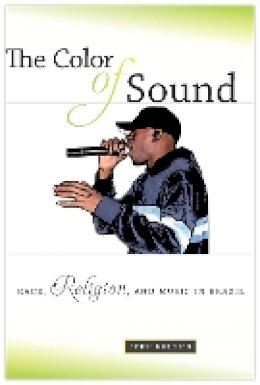
The Color of Sound. Race, Religion, and Music in Brazil.
John Burdick
Throughout Brazil, Afro-Brazilians face widespread racial prejudice. Many turn to religion, with Afro-Brazilians disproportionately represented among Protestants, the fastest-growing religious group in the country. Officially, Brazilian Protestants do not involve themselves in racial politics. Behind the scenes, however, the community is deeply involved in the formation of different kinds of blackness—and its engagement in racial politics is rooted in the major new cultural movement of black music.
In this highly original account, anthropologist John Burdick explores the complex ideas about race, racism, and racial identity that have grown up among Afro-Brazilians in the black music scene. By immersing himself for nearly a year in the vibrant worlds of black gospel, gospel rap, and gospel samba, Burdick pushes our understanding of racial identity and the social effects of music in new directions. Delving into the everyday music-making practices of these scenes, Burdick shows how the creative process itself shapes how Afro-Brazilian artists experience and understand their racial identities. This deeply detailed, engaging portrait challenges much of what we thought we knew about Brazil’s Protestants,provoking us to think in new ways about their role in their country’s struggle to combat racism.
Product Details
About John Burdick
Reviews for The Color of Sound. Race, Religion, and Music in Brazil.
Pneuma
Overall, this work is an admirable achievement.-,
David Lehmann
Cambridge University Press
Reading John Burdicks The Color of Sound reminded me that the Queen of Gospel, Mahalia Jackson, sang the legendary hymn 'How I Got Over' just minutes after Dr. Martin Luther King Jr. delivered his 'I Have a Dream Speech' at the historic March on Washington for Jobs and Freedom in 1963. Burdick delivers an evocative book full of fresh insights, analyzing how religious music makers and black gospel have the potential to create deeply meaningful and positive new politically engaged black and Afro-Brazilian identities in Brazil.
Donna M. Goldstein,author of Laughter Out of Place Reveals the little-studied, but vast realm of transnational Christian popular music that circulates outside of mainstream channels. Burdicks evocative study of the vibrant scene of black evangelical music in São Paulo invites us to rethink notions of sonic performance, its relation to the body, and its reverberations in a modern urban society fraught by durable racial and social inequalities. Combining a richly textured ethnography with novel theoretical insights, this book points to new directions in the study of race, space, and faith in Brazilian culture.
Christopher Dunn,Tulane University
